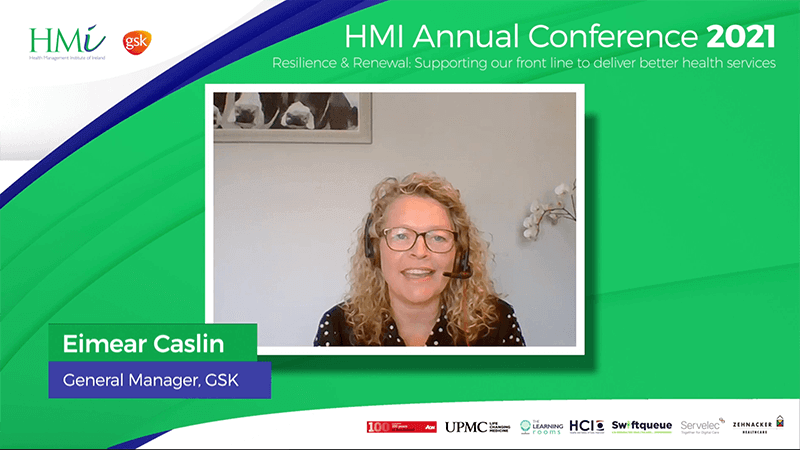She had no doubt all stakeholders would agree that the enhanced cooperation and collaboration between the pharmaceutical industry and the HSE and Department of Health during the pandemic should be carried into the future, Ms. Eimear Caslin, General Manager for GSK Ireland, a long time sponsor of the HMI, told the Conference.

This was the future when all three would be working together to negotiate a new Framework Agreement on the Supply of Medicines, between the State and the pharmaceutical industry in the coming months and also working to implement Sláintecare and deal with the fall-out from the pandemic in the years to come.
“Across the health service, we’ve seen new levels of cooperation and communication between the HSE, the Department of Health and the pharmaceutical industry throughout the pandemic. At GSK, we were in regular contact with the HSE and the Department from the beginning of the crisis, to ensure supply levels of essential medicines were maintained – as were our peers across the pharmaceutical industry.”
She believed the pharmaceutical industry, scientists, academics and regulators globally working together as partners in healthcare for a better future would find solutions to the challenges we faced.
Ms. Caslin said she would like to congratulate Tony Canavan on his election as the new HMI President and wish farewell to Lorcan Birthistle the HMI’s outgoing president.
She was delighted to share her reflections particularly on the subject of resilience.
“I’m sure we can all recall exactly where we were in March last year when we entered lockdown for the first time. Like many businesses, at GSK we had been preparing for several weeks to move to remote working and we’d been reviewing our business continuity plans to ensure there would be no disruption to the supply of our medicines into Ireland.
“But not for one moment did we anticipate that more than a year later, we’d still be working from home, physically disconnected from our colleagues. It has been an incredibly challenging 13 months for everyone, particularly for those working on the frontline in the health service.
“Despite all the challenges we have faced, it has also been a year where I’ve been continually struck by people’s resilience and adaptability.
“I’ve witnessed this first-hand in my team at GSK. They’ve worked with greater agility to find new ways to conduct our business activities. They’ve found new ways to connect with each other and demonstrated greater empathy towards one other, recognising that everyone’s personal circumstances have been affected by the pandemic. And collaboration both internally and externally has been, in many ways, enhanced.
“At GSK we’ve always been committed to providing an environment that allows our people to thrive, but that became even more critical over the last 12-months. From the outset, we knew that keeping people feeling connected would be important for their wellbeing, and to ensure they felt motivated and focused on their performance priorities.
“We have a motto that everyone should feel able to be themselves at work, feel good and keep growing. And we know that when each of us feels our best, we perform at our best – but let’s be honest, it has probably never been more difficult to feel our best than it has been during the past year.”
Ms Caslin said that to address this, they did small things like making their monthly town hall fortnightly. They set up a series of virtual coffees for informal catchups and set up a group on their internal social channel focused solely on wellbeing where people could share images of activities that were bringing them joy.
“We’ve continued to mark occasions like Halloween, Christmas and Easter – while going easy on the virtual quizzes!
“We’ve also encouraged employees to prioritise their physical and mental health and wellbeing, providing a range of programmes to help our people take control of their health. We’ve also encouraged everyone to use their annual leave to rest and recharge, even if that is at home.
“Most importantly, we’ve operated on the basis of trust and flexibility, empowering people to get their job done, while balancing their personal responsibilities. We’ve recognised that many people want more flexibility about how and where they work and, at GSK, this will be formalised in a post-pandemic world when our office-based employees will have Performance with Choice, an initiative whereby individuals will be able to choose how many days a week they work from home and how many days they spend in the office.
“I’m hopeful that these lessons of the pandemic, in terms of how and where we work, will be retained into the future, giving people a better work-life balance than they had before.
“I’d like to end by saying that our colleagues on the front lines of the health service must be acknowledged for the enormous professional challenges they’ve faced over the last year and for adapting under huge pressure to innovative and new ways of working to ensure patients continue to get the care they need.
Thanks again to the HMI for hosting this event. I look forward to the rest of the morning’s sessions and I hope that in the not too distant future, we will be able to attend this event in person once again.

